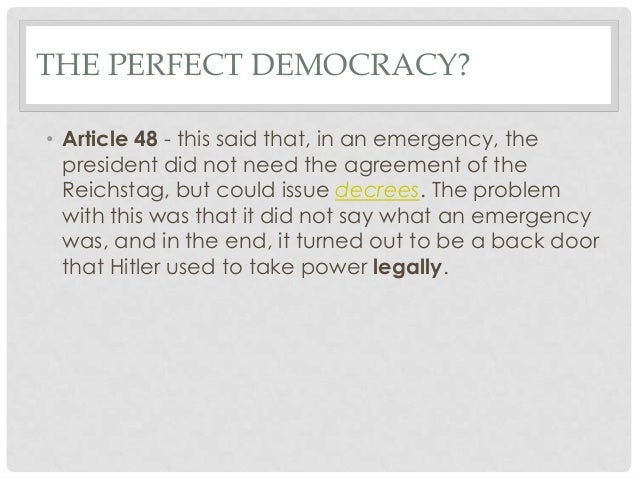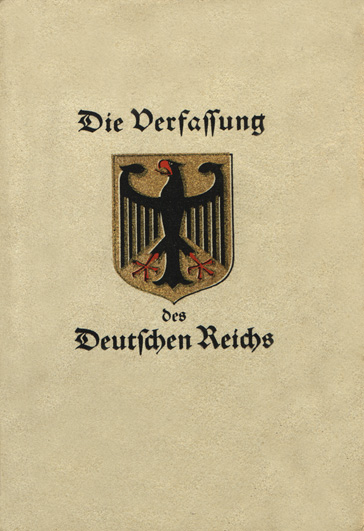Article 48 (Weimar Constitution)
As the emergency decree laws Associate arrangement of executive power is referred to in a crisis usually. In many historical and contemporary constitutions such instruments are regularly provided. If they are not covered by the existing legal order, is breaking the law ( constitutional crisis ).
In German, the term refers mostly to the Weimar Constitution (WRV ).
Application in the Weimar Republic
The terms emergency decree and issue emergency decrees themselves are not mentioned in Article 48 of the Weimar Constitution. The article gives the President's far-reaching possibilities for the government in a state of emergency (see presidential cabinet ). While in paragraph 1 of Article 48 of the Weimar Constitution, the imperial execution is controlled (ie measures against the countries of the empire ), provides in paragraph 2 the President's police powers for the state of emergency. From this, the law has been derived in the constitutional practice to adopt formal regulations with material force of law. The Constitution provided for the exemption powers a concretization of an exemplary law (Art. 48 para 5). Since this was never adopted, those powers were very wide and vague.
The powers under Article 48 have been characterized by the strong indeterminacy content of a concrete government practice, decisions of the Constitutional Court and the ruling doctrine of constitutional law. The prevailing constitutional opinion, represented inter alia by Gerhard Anschütz, approved the Reich President for the power to adopt legally justifiable emergency decrees. The dissenting minority opinion, represented mainly by Carl Schmitt, Erwin Jacobi and Hermann Heller, could not prevail and explicitly abandoned.
The National Assembly followed up with regard to the wording of article 48, paragraph 2 WRV with the factual concept of a "significant disturbance or threat to public security and order " to the well-established already in the Empire police law general clause. The terms go as technical terms back to the Prussian General Land Law. However, it never came to that the constitutional term was defined adjudicative or legally binding in this sense.
Originally, it was thought only of real emergency situations; with the increasing incapacity of the German Reichstag was the political inclination to use this right of the President as a replacement legislation. Already under Friedrich Ebert, this instrument was applied, for example, on November 9, 1923 on the occasion of Hitler putsch. Above all, it was used after the March 27, 1930 shattered the grand coalition and the Müller government has resigned. From then on there was no government, which would have a majority in Parliament can support; The Chancellor has since been appointed without regard to the Reichstag only by the first time in 1925 elected Reich President Paul von Hindenburg: first Heinrich Brüning, later Franz von Papen, Kurt von Schleicher and finally Adolf Hitler. With the so-called presidential cabinets a break with parliamentarism was accepted. The proportion of emergency decrees on the ( de facto ) since 1930 legislation increased significantly. 1931 were 34 adopted by the Reichstag laws against 44 emergency decrees.
Nevertheless, the Reichstag could topple governments and repeal emergency regulations. In Brünings reign this not only prevented government parties as the center, but also the opposition SPD. As the term of office of Papen, however, the SPD was for fighting the German government, so let Hindenburg to dissolve parliament twice, in order to forestall the abrogation of emergency decrees. In the end he gave in 1933 Papen's urging for introduction of a coalition government under Hitler.
The most far-reaching emergency decree was the so-called Reichstag Fire Decree of 28 February 1933. Based on the article 48, paragraph 2 of the Weimar Constitution ( "Dealing with disturbance of law and order " ) she helped shape the fundamental rights suspended and transferred the powers of the President to the new national government under Hitler. The emergency decree thus became the normative basis of the Nazi dictatorship, the " charter of the Third Reich ".
Wording of Article 48 of the Weimar Constitution
( 1) If a country does not meet the required of it by the Constitution or laws of the kingdom of duties, the President is to stop it with the help of the armed forces. ( 2) The President of the Reich, when the German Empire which is considerably disturbed or endangered public safety and order, take the necessary for the restoration of public security and order, if necessary, intervene with armed force. For this purpose he may place the set in Articles 114, 115, 117, 118, 123, 124 and 153 fundamental rights in whole or in part overridden temporarily. ( 3) Of all the measures taken pursuant to paragraph 1 or paragraph 2 of this Article shall give immediately the Reichstag knowledge of the Reich President. The measures are to be set at the request of the Reichstag overridden. ( 4) In urgent cases, the State Government may take urgent interim measures of the kind referred to in paragraph 2 for the area. The measures are to be set at the request of the Reich President or the Reichstag overridden. ( 5) Details shall be a kingdom of law.










